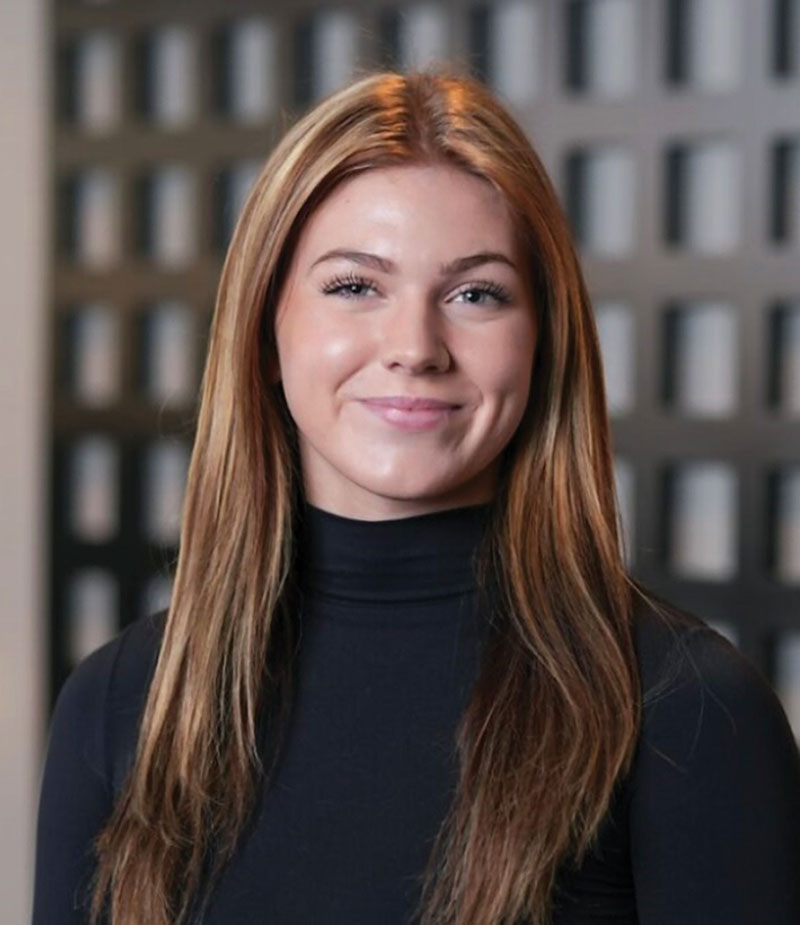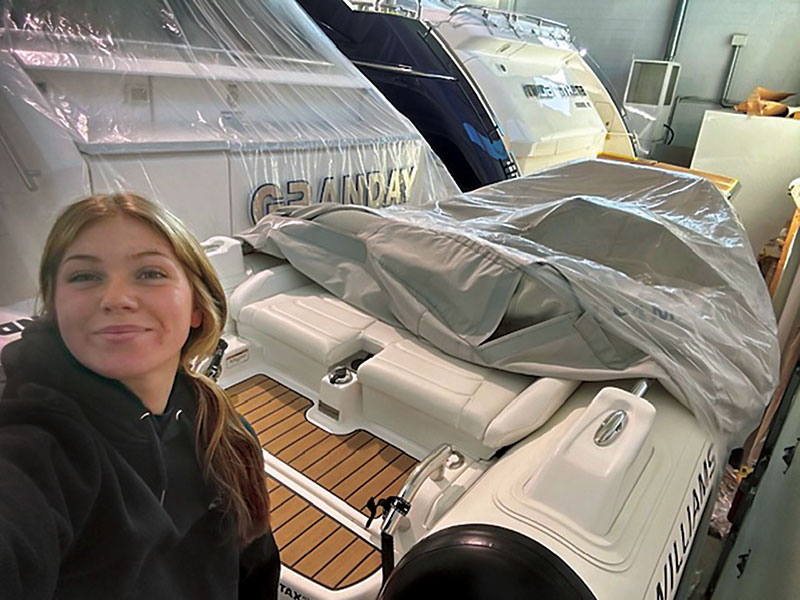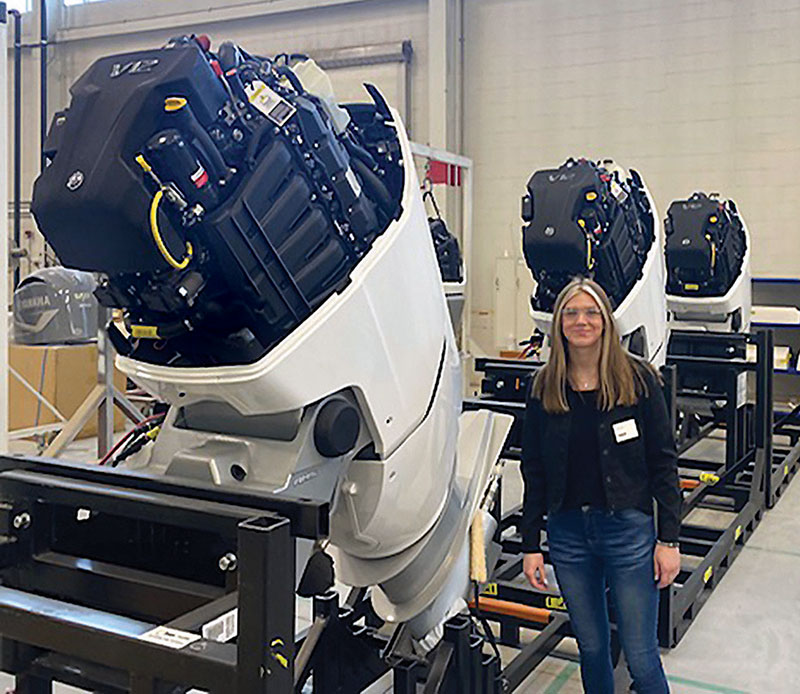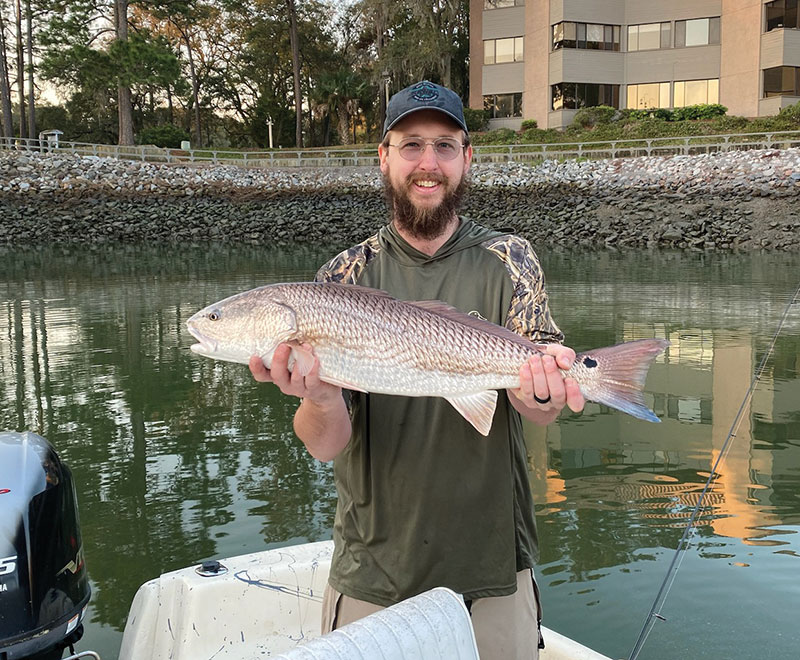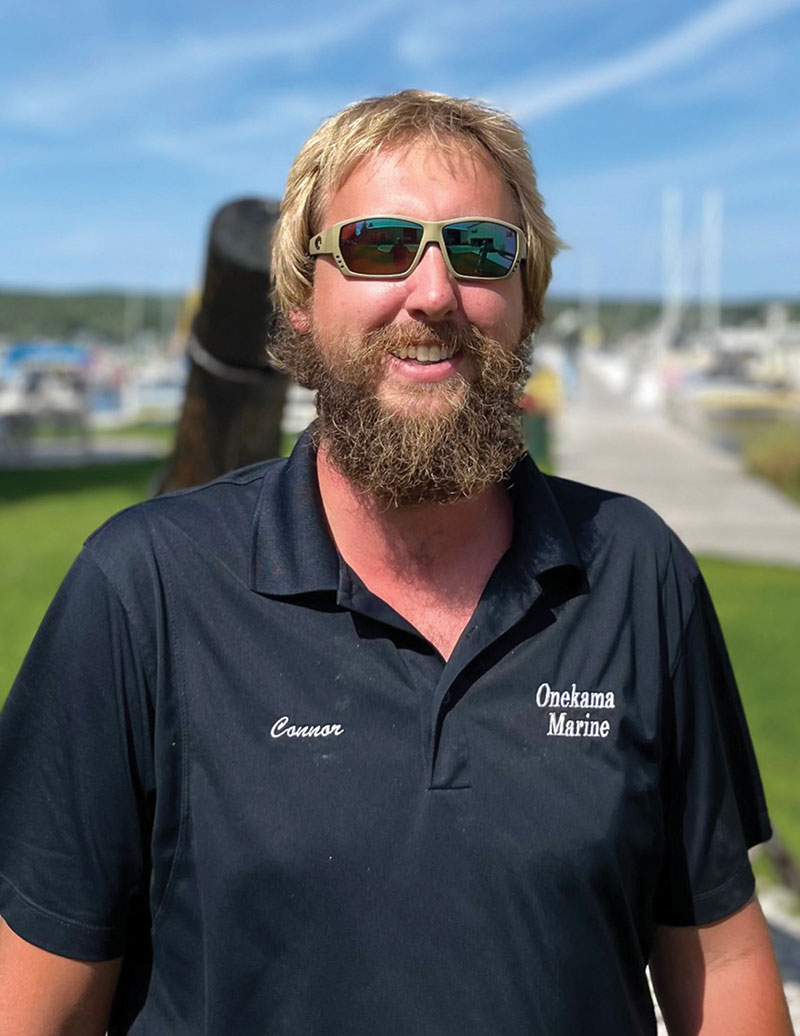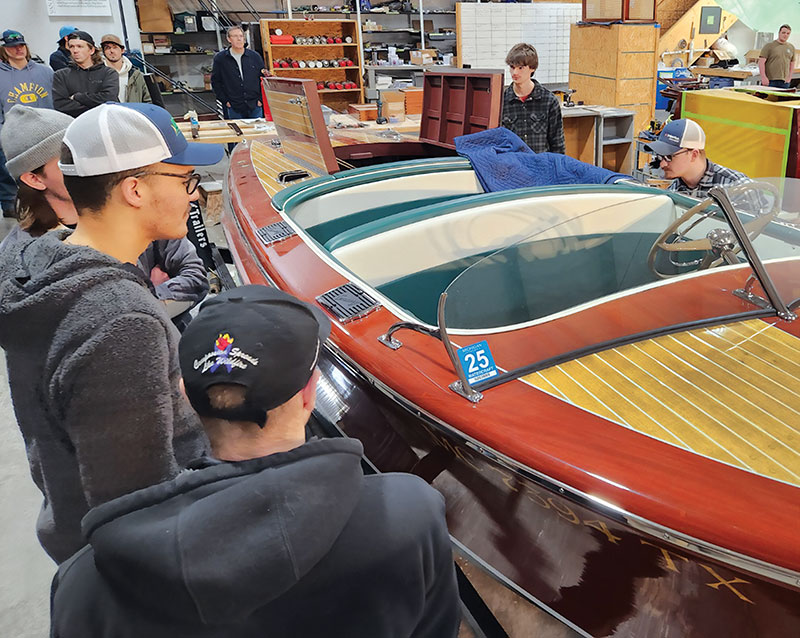
Workforce development, part II: Next-gen marine tech
Earlier this year, Lakeland Boating spoke with Amy Krueger, president of Jefferson Beach Yacht Sales, and Nicki Polan, executive director of the Michigan Boating Industries Association, for a piece titled, “The Time to Act is Now.” It explored a significant challenge facing the boating industry, one that affects all of us as recreational boaters.
When we invest in a boat, we want to spend as much time as possible on the water, making memories with loved ones — not waiting weeks for service appointments and repairs. Workforce development is critical, and at the moment, we are dealing with a shortage of qualified marine technicians.
Attracting young people to this career path is critical. We recently sat down with two marine techs from the Gen Z and Millennial cohorts; they shared their journeys, what they love about their work, and the advice they have to offer those who will follow in their footsteps.
Meet Gabriella Inman
Gabriella Inman, 21, hails from Niles, Michigan. Her father was in the tool-and-die business, while her mother and maternal grandfather were contractors.
“I’ve been in the trades my whole life,” she says with a laugh.
A licensed charter captain, her father also had a passion for boats. Eight years ago, he purchased a Trojan and set about refurbishing it. Fourteen- year-old Inman joined him.
“I loved helping him with it,” she recalls. “It was quality time with my dad. Then we got a 30-foot Silverton, and I helped with that. It was how I got started — dabbling with fixing things.”
While she was in high school, Inman sought summer employment with Brian’s Marina in St. Joseph, Michigan. She worked on the fuel dock and in the parts department, and the experience revealed her path forward.
“Until my sophomore year, I wasn’t sure about my career,” Inman says. “I had only done work on boats with my dad, but I loved my summer job at the marina.
“One of my sisters was a professional dirt bike rider,” she continues. “The other one wrestled for the Michigan USA team. I learned that I loved being around boats.”
Inman decided to enroll at the Cedarville, Michigan-based Great Lakes Boat Building School in 2021-22, following her high school graduation. She admits she second-guessed her decision on more than one occasion.
“Being a woman in this business is intimidating, and I was struggling,” she says. “But my mom always said if you put your mind to it, you can do it, and I was raised by my dad to not be afraid to get dirty. One of my teachers also really changed my perspective on things.”
That teacher was Mike Downey, who, at the time, was with Bergmann Marine in Charlevoix. Downey was a big believer in intergenerational knowledge-sharing.
“It was the way he taught me,” Inman explains. “He passed on so much knowledge and was so energetic. I could see how passionate he was about his career, and how appreciative he was for it. He told me you have to want to be better for yourself, your company and your customer.
“GLBBS had a relatively new program with limited resources, but it gave me real-world experience,” she adds. “The school, Mike and my fellow students gave me the lock and key I needed.”
She took her first job with Starboard Choice Marine in Edwardsburg, Michigan. Last October, she joined the team at Jefferson Beach Yacht Sales (JBYS); she works at the company’s Holland, Michigan, location.
“No school can fully prepare you for this,” she says. “My advice? Learn as much as you can from the older techs, soak up information like a sponge, don’t be afraid to ask questions, and always own up to your mistakes.”
Inman also cautions that this career requires a solid work ethic. In other words, poor performance will not be rewarded.
“If you’re willing to work hard, have integrity and are fully committed, you will be well compensated,” she says. “You must be teachable as well. You won’t know everything just because you have worked on your own boat.”
Inman is now an American Boat and Yacht Council-certified technician. She says she takes advantage of every opportunity to further her education so that she can work on a wide variety of gas engines, diesel engines and other marine systems.
“I want to get to the highest point of education I can, because every boat is different, and every day is different,” she explains. “I love helping people. I love when they call me and say, ‘I have this problem,’ and I can fix it for them so they can go out on the water with their family.
“I see the light when they know they’re going to have that joy outside their regular life,” she continues. “It’s just like with my dad. I remember seeing his excitement when he passed on knowledge, teaching me. That happens with my customers, when they understand what’s wrong and how I’m fixing it. That same light bulb goes off.”
Inman is also a licensed charter captain, and when she’s not busy at JBYS, she enjoys working alongside her father as first mate in their family business, Leg-A-Sea Charters. They conduct fishing charters and sunset cruises out of St. Joseph aboard their 40-foot Sea Ray.
“Ninety percent of my life is boating,” she says. “I understand my customers because I’ve been in their shoes. My mom and dad love that I do this. If my dad runs into a problem, my mom says, ‘call Gabby!’”
Inman says she hasn’t met another female marine tech and would like to see more women in the business.
“This was a solid career choice for me,” she observes. “You just have to be willing to set boundaries, earn respect and hold your ground when necessary. Be bold and never give up.”
Connor Bowlby, 30, works as a service technician for Onekama Marine in Onekama, Michigan. He says he shares his customers’ passion for the boating lifestyle.
Meet Connor Bowlby
Connor Bowlby, 30, grew up in a Michigan boating family. In addition to spending countless happy hours on Crystal Lake just north of Frankfort, he also fell in love with big boats and offshore fishing along Alabama’s Gulf Coast.
A boating industry career was not initially on his radar. After his graduation from high school in 2012, Bowlby attended the University of Montevallo in Alabama, with the intention of pursuing a business degree. He was there for two years.
“As a student, I took a job doing landscapes,” he remembers. “My coworkers seemed so happy not working at a desk all day.”
Bowlby had been a Best Buy employee since he was 17 and he knew he enjoyed mechanics and technology. He decided to become an automotive technician and transferred to Alabama’s Lawson State Community College, where he earned his associate’s degree in 2015.
After 10 years in Alabama, Bowlby moved back to Michigan and he made the shift from automotive to marine tech work. He said this shift felt like a natural one for him; not only has he been able to channel his love of boats into his work, but also his skill set easily transferred to the marine industry.
“It doesn’t matter if it’s cars or boats,” he observes. “You just need to understand how things work and know how to fix them.”
He also says his education is ongoing.
“If you take a job as a mechanic and don’t like school, that backfires,” he explains, laughing. “A friend of mine who is a doctor once said to me, ‘You have as much school as we do!’ I always go back to school every year. I have to learn new systems.”
Bowlby is now in his fifth year at Onekama Marine in Onekama, Michigan, where his ongoing education comes through boat builders and engine manufacturers that offer hands-on training. Riviera Yachts, for example, sends representatives from Australia.
“No school could teach me that,” he says. “It’s a big deal to have them here because they built the boats. Learning about the European components helps me with other overseas brands as well. Onekama is great about providing these opportunities.”
Advanced automotive technology is finding its way into the recreational boating lifestyle, and Bowlby notes that this provides important opportunities for younger technicians. The work isn’t just about old-school marine tech anymore.
“You need to know these new systems,” he says. “On the other hand, you also have to relearn technology that is obsolete in cars now, but you still find it on boats.”
For Bowlby, one of the best parts of the job is that he is rarely in the shop. Instead, he is out on service calls, which means plenty of time on the dock and on the water.
He also enjoys his interactions with customers because he shares their passion. As he puts it, they’re not just dropping off their car to be fixed and picking up a loaner to go to work or the grocery store.
“The biggest difference with marine industry customers versus automotive customers is that they want to fix their boats ASAP to go out on the lake,” he observes. “I love toys, so I understand that. The customers are excited. They’re not asking me to fix a car. Or a bulldozer.”
As far as advice is concerned, Bowlby notes that there are plenty of job opportunities available, but you will have to be patient. There is a significant learning curve, and compensation ramps up over time.
“The biggest misconception is that you’ll go to school to be a mechanic and immediately know what you’re doing,” he explains. “You won’t. And you won’t make more money until you do know what you’re doing. So, get your credentials. I did, and the job market made me feel like I made the right choice.”
He cautions newbies to avoid “overrunning their credentials” before they have the necessary hands-on experience and to learn how to diagnose problems. With diagnostics, he says, a technician’s time is worth more.
Finally, Bowlby advises young techs to think about career longevity, not just what it might look like in the short term.
“When you’re 20, you don’t think about what life will be like when you’re 60,” he says. “Think about what other skills you should have, when the time comes that you can’t or don’t want to be crawling around a bilge anymore. One option is to move into sales; with a tech background, you’ll be able to provide a great customer service experience.”
Like Inman, Bowlby enjoys spending time on the water when he’s not working. He and his wife have several watercraft, which include pontoons, deckboats and Jet-Skis; their favorite spots include Portage Lake and Tippy Dam Pond, both in Manistee County, Michigan.
These two dedicated, skilled marine technicians represent the future of the boating industry and are leading the way for others who share their interests and passions. With access to education, experienced mentors, and appropriate resources and opportunities, others will follow — and the future will be very bright indeed.
This is the second installment in a three-part series exploring workforce development issues in the boating industry.


